Mining: Economic Rebirth of The Abandoned Single-Industry Towns

Mining is a very complicated industry surrounded by controversies and widely different opinions. Some people consider it as a threat to the existing ecological agreements since today miners use more than half of the electricity consumed by the Netherlands on a yearly basis. According to the other opinions, mining is new hope for the dying mono-industrial cities, relics of the industrial revolution and post WW2 booming development race.
Mono-cities are a colossal issue for everyone in today's, mostly post-industrial world, where production of the physical item does not mean an automatic profit-making. Basically, most of them were simply doomed, because the city-forming enterprises had fallen into decay or had been simply withdrawn from the city. As a result people were leaving their hometowns, which were rapidly losing all perspectives and hopes for the future. Today Bitnewstoday.com will tell you about two examples, where nascent mining industry was giving new alternatives to the towns decreasing the number of their inhabitants.
Ocean Falls is a small rural town in Canada situated in a middle of nowhere with half of the roads built on the wooden footing that makes getting there without a boat or a plane something next to impossible. Majority of the townspeople were working at the papermaking mill. However, it stopped making the profit and end up closing. From whooping 5000 people, the population declined to the less than 100 mark. They were facing a difficult dilemma of digging their heels into the dirt and waiting the hard times to be over or leave. Obviously, people started to leave and the once upbeat town began to die.
It wasn't surprising that not many people were interested in moving to Ocean Falls: small town, far from the main roads, is less than uninteresting for the traditional industry. The only thing that was staying afloat and feeling more or less “okay” was a local salmon hatchery. So - young people started to leave in flocks. But then, miners came into the town. They were not bothered by the poor logistics because all they needed was internet and electricity.
And because of the local dam, that belonged to the local company offering cheap electricity to the conquerors of hashrate and blockchain, miners. Crypto enthusiasts became the sole reason why life started to return to the town. But life wouldn’t be life if it were all that easy.
After a while, BC Hydro became unhappy with the tariffs that the dam was offering. In fact, it still has significant surplus energy at Ocean Falls, but it is holding back due to a legal dispute with local public utility over the price it charges to deliver power to its residential customers. Dam owners and locals are worried that result of the said dispute, which is currently in arbitration, will manifest in the form of a mandate from regulators, forcing them to charge miners prices high enough to drive Ocean Falls Blockchain out of town.
This is not an exclusively American thing - back to Switzerland that used to be a reigning queen of the crypto, there are some cases like this.
Swiss village named Gondo that got devastated by the landslide was dying out. The local population moved out, and the village was under a serious risk to turn into a ghost town. But the situation changed because of the miners. Combination of the low-low prices on the electricity and cheap lease ended up a win-win situation for the nascent industry.
The flagship of the upcoming change was the Swiss startup Alpine Mining, that got attracted to the Gondo only seven months ago. Exceptionally low tariffs brought other miners as well and soon enough 12 more companies operating in the field of cryptocurrency submitted the application for the opening of production enterprises in the area.
The local municipality established preferences for the miners since they maintained a low level of prices for electricity and rent. However, there is a limiting factor: there is only one transformer in Gondo. And for the construction of new ones, permission from the cantonal authorities to transfer farmland into industrial development land is required.
The deputy mayor of Gondo, Paul FUCHS, is confident that permission will be obtained soon. However this takes time and in the nearby area, the canton of Valais, which holds the primacy in Switzerland for electric power generation at the hydroelectric power station, the possibilities for the arrangement of mining farms are equally tempting due to the fact that required infrastructure already exist.
This way we can see another side of the crypto trade, that is relatively unobvious to the naked eye. It can solve issues that were caused by the traditional economic system, where the "free market" brought the severe sentence to monotowns without any bias. In order to deal with this an addition of just a couple of ingredients needed, such as cheap power, cold climate, and cooperation of the local authorities.